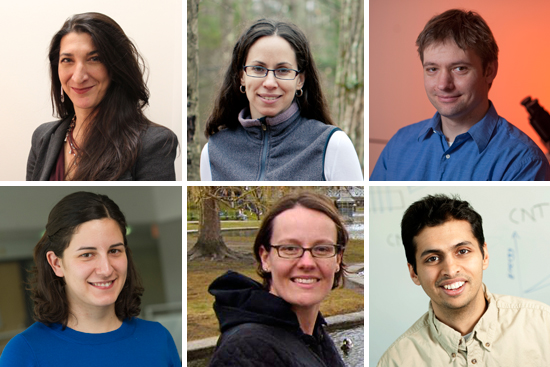BU Researchers Receive NSF CAREER Awards
Prize supports research, education

Winners of the NSF CAREER awards are Lorena Barba (clockwise from top left), Pamela Templer, Michael Smith, Ajay Joshi, Lucy Hutyra, and Ayse Coskun. Barba and Coskun photos by Vernon Doucette. Joshi and Smith photos by Kalman Zabarsky. Templer photo by Melody Komyerov. Hutyra photo courtesy of Lucy Hutyra
The United States, China, Japan, and others are racing to build the first “exascale” computer, a super-machine able to perform as many operations in a second as 50 million laptops. Lorena Barba’s research tackles two parts of this quest: researching the necessary algorithms and software, while pondering how to educate future computer scientists about the technology.
The government deemed her work vital enough that Barba, a College of Engineering assistant professor, was recently awarded a CAREER award, the National Science Foundation’s (NSF) most important prize for junior faculty. She is among a half dozen BU scholars to receive the honor this year. The six were recognized for their work in climate change, developing advanced computing power while curbing that power’s voracious energy consumption, and training future scientists.
Exascale computing will enable science to improve such things as climate modeling, predicting natural disasters, and simulating proteins essential to life. “The current worldwide race to reach exascale computing is really about maintaining growth in computer performance,” Barba told an interviewer. Noting that a 1944 computer, the Harvard Mark I, was a tortoise at three operations per second, she said ever-faster computing has become essential to society, and educating computational scientists is “crucial for success in exploiting computer performance for scientific discovery.”
CAREER awards recognize “innovative research at the frontiers of science and technology” as well as the winners’ commitment to community service, according to the NSF. That BU collected six awards amid stiff competition “testifies to the breadth and depth of research talent we have here,” says Jean Morrison, BU provost. “We’re all excited to see what these talented researchers are able to achieve through their project awards and wish them the best of luck.”
The other BU winners, besides Lorena Barba, are:
- Ayse Coskun, an ENG assistant professor of electrical and computer engineering, is also researching energy efficiency in a type of computing system, so-called 3D stacked systems. “A realizable target for this project in the next decade is a significant reduction in overall energy consumption for computing infrastructure,” his project abstract says.
- Lucy Hutyra, a College of Arts & Sciences assistant professor of geography and environment, researches what her abstract calls the understudied effects of urbanization on carbon dioxide emissions, a key contributor to global warming. She’ll map ecosystem changes across an urban-to-rural spectrum and historical land patterns to assess “the carbon consequences of increasing urban lands,” among other things. The research is important to develop policies for environmental protection and food and energy production as humans multiply in urban areas, says the abstract.
- Ajay Joshi, an ENG assistant professor of electrical and computer engineering, is researching how to make computing more energy-efficient, in particular by improving silicon-based data-sharing systems within and between computers. The abstract to his research says that with computers’ energy gobbling growing, it’s “absolutely critical to develop energy-efficient solutions for computing systems.”
- Michael Smith, an ENG assistant professor of biomedical engineering, studies multicellular cultures to learn about cell mechanics and how cells communicate. “The coordination of multicellular behavior is critical to numerous physiological processes such as morphogenesis”—the development of structural features—“and wound repair,” according to his abstract. His project also seeks to develop a one-hour lesson on cell mechanics for local high school students and a new graduate course on the topic.
- Pamela Templer, a CAS assistant professor of biology, is working on the varying effects of climate change in northern American forests. “For example,” her abstract says, “soil warming in summer may increase root growth, but warming in winter may increase the frequency of freeze/thaw cycles and damage plant root systems.”
The NSF, Uncle Sam’s science-incubating agency, has a $7 billion annual budget and funds one-fifth of all federally supported research in American academia. It is the major federal grantor of research money for mathematics and computer science.

Comments & Discussion
Boston University moderates comments to facilitate an informed, substantive, civil conversation. Abusive, profane, self-promotional, misleading, incoherent or off-topic comments will be rejected. Moderators are staffed during regular business hours (EST) and can only accept comments written in English. Statistics or facts must include a citation or a link to the citation.